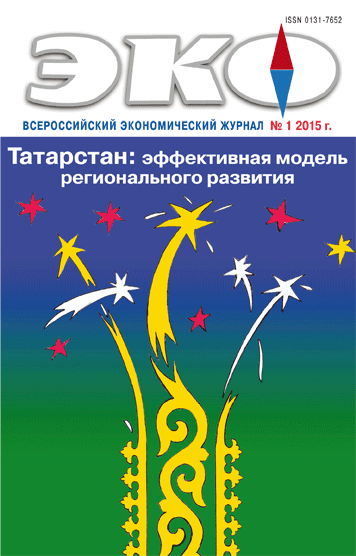Published 2018-07-09
Keywords
- GLOBAL ECONOMIC GOVERNANCE,
- INTERNATIONAL ECONOMIC INSTITUTIONS,
- EFFICIENCY-LEGITIMACY DILEMMA,
- BRICS,
- G20
How to Cite
1.
Afontsev С. Perspectives on Global Economic Governance. ECO [Internet]. 2018 Jul. 9 [cited 2026 Jan. 19];45(1):101-13. Available from: https://ecotrends.ru/index.php/eco/article/view/924
Abstract
Since the beginning of the global financial crisis in 2008, the architecture of global economic governance has undergone substantial changes. Although much progress has been made in reducing democracy deficit which had long plagued international economic institutions, the traditional legitimacy-operativeness dilemma is still in place. To cope with this dilemma, multilateral regulatory initiatives should be supplemented by a country-club approach in areas where serious interest mismatch of major global players is present. Recent financial initiatives of the BRICS countries are revealing examples of potential gains such an approach can bring without affecting any third party negatively.References
1.
Статья подготовлена в рамках Программы фундаментальных исследований ОГПМО РАН Формирование основ многополярного миропорядка и роль России в этом процессе
2.
Nye J. S. The Democracy Deficit in the Global Economy: Enhancing the Legitimacy and Accountability of Global Institutions. Washington: Brookings Institution Press, 2003; Green J. Engaging the Disenfranchised: Developing Countries and Civil Society in International Governance for Sustainable Development. An Agenda for Research. The United Nations University, Institute for the Advanced Study of Sustainability Report, February 2004; Langmore J. and Fitzgerald Sh. Global Economic Governance: Addressing the Democratic Deficit // Development. - 2010. - V.53. - № 3. - Р. 390-393.
3.
Dany Ch. Janus-Faced NGO Participation in Global Governance: Structural Constraints for NGO Influence//Global Governance. -2014. -V.20. -№ 3. -Р.419-436.
4.
Gnath K., Mildner S. -A., and Schmucker C. G20, IMF, and WTO in Turbulent Times. Legitimacy and Effectiveness Put to the Test. SWP Research Paper no.10, Berlin, August 2012; Bossone B., Malaguti M. Ch., Cafaro S. and Di Benedetto S. (eds.). Legitimacy and Effectiveness in Global Economic Governance. Cambridge: Cambridge Scholars Publishing, 2013.
5.
Broome A. Issues and Actors in the Global Political Economy. -NY: Palgrave Macmillan, 2014. -Р. 80-91.
6.
Коммюнике лидеров Группы 20 по итогам саммита в Брисбене. Ноябрь 2014 г. URL: http://news.kremlin.ru/media/events/files/41d51ac333c6c9b83233.pdf (дата обращения: 04 декабря 2014 г.); A G20 Agenda for Growth and Resilience in 2014. G20 Policy Note, July 2014. URL: http://www.g20.utoronto.ca/2014/2014-policy-notes.html (дата обращения: 04 декабря 2014 г.).
7.
Смыслов Д. В. Реформирование Международного валютного фонда: проблемы и решения // Деньги и кредит. - 2012. - № 1. - С. 36-43; № 2. - С. 33-44; Vestergaard J. and Wade R. H. Out of the Woods: Gridlock in the IMF, and the World Bank Puts Multilateralism at Risk // DIIS Report. - 2014. - Jun.
8.
Palan R. and Nesvetailova A. The Governance of Black Holes in the World Economy: Shadow Banking and Offshore Finance. In: Moshella M. and Weaver C. (eds.). Handbook of Global Economic Governance. Players, Power and Paradigms. -NY: Routledge, 2014. -Р. 286-200.
9.
Смеетс М. Несовместимые цели: санкции и ВТО//Россия в глобальной политике. -2014. -Т. 12, № 4. -С. 130-142.
10.
World Trade Report 2014. Trade and Development: Recent Trends and the Role of the WTO. Geneva: WTO. 2014. -Р.186-206.
11. Афонцев С. А. Мировая экономика в поисках новой модели роста//Мировая экономика и международные отношения. -2014. -№ 2. -С. 3-12.
12. Darvas Z. G20: Quo Vadis? In: Who Will Govern the New World. The Present and Future of the G20. -Beijing: Social Sciences Academic Press, 2014. -Р. 59-70.
13. Форталезская декларация. URL: http://news.kremlin.ru/media/events/files/41d4f1dd6741763252a8.pdf (дата обращения: 04.12.2014).
14. Strand J. R. Global Economic Governance and the Regional Development Banks. In: Moshella M. and Weaver C. (eds.). Handbook of Global Economic Governance. Players, Power and Paradigms. -NY: Routledge, 2014. -Р. 290-303.
15. Афонцев С. Доминирование доллара: есть ли альтернативы//Россия в глобальной политике. -2014. -Т. 12, № 4. -С.120-129.
16. Triennial Central Bank Survey. Foreign exchange turnover in April 2013: preliminary global results. Bank for International Settements, September 2013.

